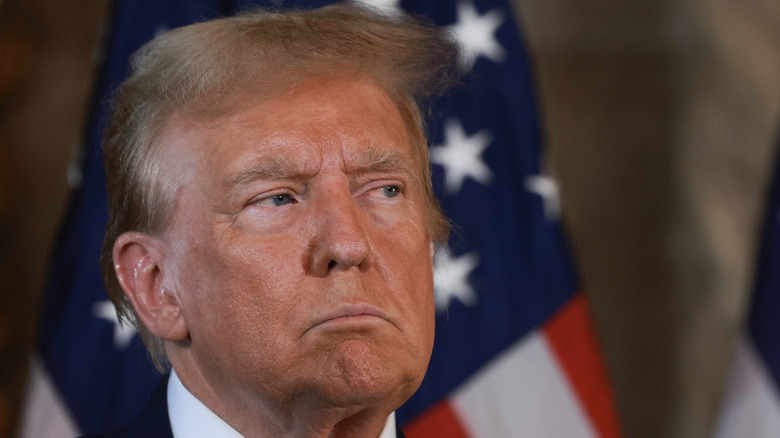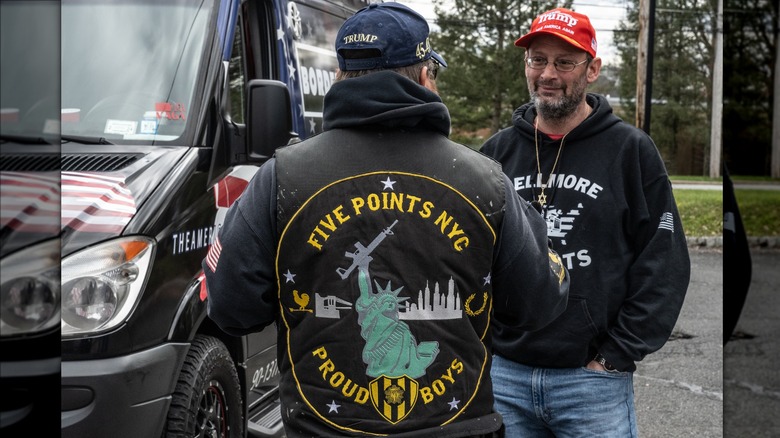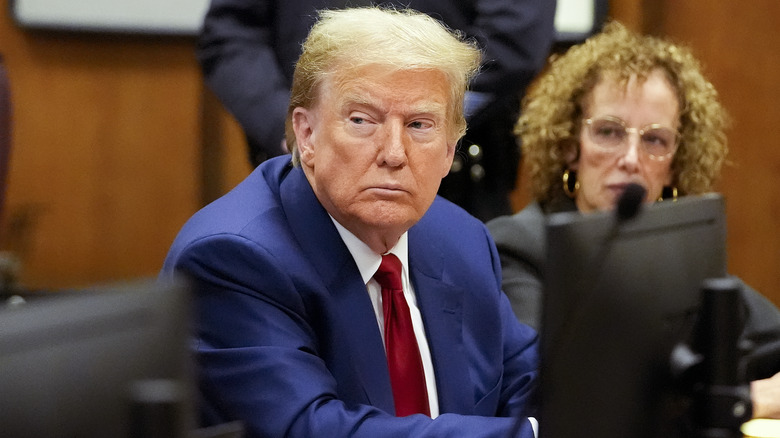These Unique Questions Will Determine How Jurors Are Chosen For Trump's Historic Criminal Case
At least 12 New Yorkers are going to have to clear their calendars for a while as the historic "hush money" case against Donald Trump begins on April 15, 2024. In the first-ever criminal case against a former president, prosecutors will try to prove Trump falsified records related to a payment to Stormy Daniels to keep quiet about an alleged affair.
Trump has said he will testify in his defense; in a press conference (per Daily Mail), he declared, "All I can do is tell the truth. And the truth is, that there's no case. It's a scam. It's a scam. That's not a trial. That's not a trial. That's a scam." This, of course, follows Trump's fraud case woes, in which he was convicted of creative bookkeeping regarding the value of his properties.
The trial will begin with jury selection, in which prospective jurors will be grilled on their ability to deliver a fair verdict on the charges. In legalese, it's called "voir dire." According to a letter submitted by the New York Supreme Court, those summoned will first be given the chance to excuse themselves based on their personal circumstances or their belief they truly can't be impartial. (This may eliminate quite a few candidates right from the get-go.) Those remaining will be given a "broad and exhaustive" questionnaire consisting of 42 questions, and the court will ask the jurors to answer each one, along with any follow-up questions attorneys may have. In other words, these folks can expect some very long days ahead.
Jurors will be asked if they belong to any infamous groups
Prospective jurors in the People v. Donald Trump trial will be given their questionnaire before being seated in the jury box; the court will then call each person by their jury number rather than by name. Many of the questions are commonly asked in any trial: work and marital status, educational background, and so forth. Jurors will also be asked about their history with crime and law enforcement, and if their experiences have caused them "to form an opinion, whether positive or negative, about the police or our criminal justice system," according to the New York Supreme Court letter.
But some of the queries are ones you don't hear every day in a courtroom. Potential jurors will have to explain whether they've ever attended a pro- or anti-Trump rally, worked for or contributed to a Trump campaign, or followed Donald Trump on social media. They won't be asked about their specific political affiliations, but their answer to one particular question will give an important hint about their leanings. Question 30 asks: "Have you ever considered yourself a supporter of or belonged to any of the following: the QAnon movement, Proud Boys, Oathkeepers, Three Percenters, Boogaloo Boys [or] Antifa?" (One can assume that a "yes" answer will automatically lead that person to be kindly dismissed from the case.)
Jurors won't be judging Trump's personal life
Being a juror in Donald Trump's hush money trial may not be as juicy as it sounds. The jurors won't be asked to decide whether the ex-president actually had an affair with Stormy Daniels. Rather, they'll be judging whether Trump falsified business records to cover up money allegedly paid to buy her silence. The long list of juror questions never once cites Daniels by name or asks whether the candidates have an opinion about Trump's personal business. They have to explain if they have "strong feelings or opinions about how Mr. Trump is being treated in this case," according to the New York Supreme Court letter. If Trump decides not to testify, jurors are also being asked to promise they won't hold that against him.
Another disadvantage to being a juror in this case is the privacy issue. Much as they may want to spill the tea to family and friends, jurors are forbidden to discuss the proceedings "with anyone in any manner" while the trial is ongoing. They're also asked to promise not to read, watch, or listen to any accounts of the case (including anything we post on The List!), so their entertainment choices will be pretty much limited to reruns of "The Bachelor."
On the plus side, jurors will get the privilege of watching Trump in person, along with Daniels, who is expected to testify. They shouldn't expect an appearance from Melania Trump, however; former aide Stephanie Winston Wolkoff has claimed the hush money case has rocked the Trumps' marriage.


